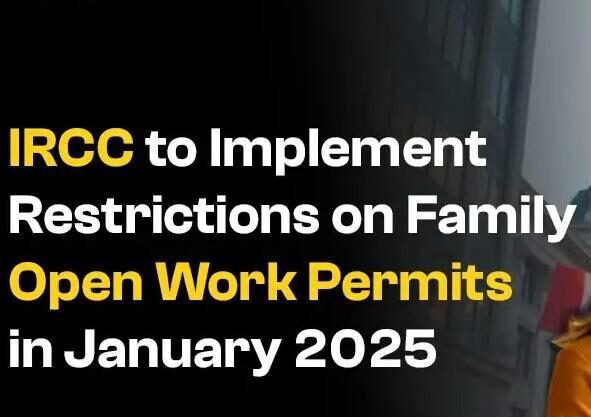In a recent announcement, the Immigration, Refugees and Citizenship Canada (IRCC) confirmed that starting January 2025, it will implement significant restrictions on family open work permits. These changes are expected to impact thousands of individuals applying for work permits as dependents of skilled workers or international students in Canada. As the rules surrounding Canada work permits evolve, it’s crucial for applicants to stay informed about the latest updates and how they may affect their plans.
In this blog, we will explore the upcoming restrictions, their implications, and how immigration consultants in Canada can guide you through the changing landscape of family work permits.
Understanding Family Open Work Permits
A family open work permit allows the spouse or common-law partner of a foreign worker or student in Canada to obtain an open work permit. This allows the spouse to work for any employer in Canada, providing much-needed financial support for families living abroad. It has traditionally been an important tool for international workers or students bringing their families to Canada.
Until now, family members of foreign workers or students could apply for these permits under relatively flexible criteria. However, the upcoming restrictions will narrow eligibility and make it more challenging for certain applicants to qualify for an open work permit.
What Will the New Restrictions Entail?
Starting in January 2025, the IRCC will impose stricter criteria on family open work permits. These changes will affect applicants in several key ways:
1. Narrower Eligibility Criteria
Under the new guidelines, only certain classes of workers and students will be able to bring their families under the family open work permit program. For example, only those working in high-skill categories under the Express Entry Canada program may be eligible for family open work permits.
Spouses and partners of those employed in low-skill or temporary positions might no longer be eligible to work in Canada under the family open work permit program.
2. Impact on International Students
The restriction will also affect the spouses or common-law partners of international students. Previously, many spouses could join their partners in Canada and contribute financially through a family open work permit. With the upcoming restrictions, fewer family members of students may be eligible for open work permits.
This is a particularly critical issue for international students who depend on their spouse’s income to support their living expenses while studying in Canada.
3. Processing Delays and Additional Documentation
Due to the new restrictions, applicants for family open work permits may also face longer processing times. With additional eligibility criteria, applications will require more documentation and more thorough reviews. These changes could delay the approval process for dependent family members.
4. Greater Scrutiny of Employment Prospects
The IRCC will likely place more emphasis on whether the primary applicant’s job or study program aligns with specific criteria to ensure that family members are permitted to work in Canada. This means that the chances of approval for family work permits will be more closely tied to the primary applicant’s employment or study situation.
Why These Changes Are Being Implemented
The government’s decision to implement these new restrictions stems from various policy shifts designed to streamline Canada’s immigration system. A focus on high-skilled workers aligns with Canada’s need for specific talent to fuel its economy. Additionally, the IRCC aims to improve the program’s integrity and reduce cases of work permits issued to family members of those in lower-skilled positions, ensuring the program benefits both Canadian citizens and applicants in a more balanced way.
The IRCC is also making efforts to ensure that those granted work permits meet the labor market needs of Canada’s economy, rather than simply providing family support for workers and students in Canada.
How These Restrictions Will Impact Applicants
For many applicants, these changes will create new challenges, particularly for those who rely on the income of their spouse or partner during their stay in Canada. Here’s how the restrictions could impact different groups:
1. International Students and Their Families
Families of international students have long relied on open work permits to support themselves while the student is studying. With the new rules in place, this could leave many families in financial difficulty.
As an international student, if you are planning to bring your spouse or partner with you to Canada, it’s crucial to work with study visa consultants for Canada to fully understand the implications of these changes. Your immigration consultant will help you assess the situation and determine whether your family can still qualify for an open work permit or if other visa options might be suitable.
2. Skilled Workers and Their Families
Skilled workers employed in Canada may also face challenges, especially if their spouses work in lower-skilled sectors. Under the new rules, spouses may no longer be eligible for open work permits if the primary applicant is employed in a lower-skilled role. It’s crucial to consult with Canada work permit consultants to understand how to best navigate these new criteria.
3. Permanent Residents and Their Spouses
Permanent residents will not be as directly impacted by the changes to open work permits for families. However, those applying for Canada PR might face added complications if they were planning to rely on family open work permits for financial support while awaiting their PR status.
How Immigration Consultants Can Help You Navigate These Changes
As these new restrictions begin to take effect, seeking the expertise of immigration consultants can be invaluable in ensuring that your application is processed smoothly and that your family’s needs are met.
1. Expert Advice on Eligibility
Experienced immigration consultants in Toronto, Etobicoke, and other regions can help you determine whether your family qualifies for the open work permit under the new restrictions. They can review your case and guide you on the best course of action based on your unique circumstances.
2. Workaround Solutions for Family Members
If you’re unable to secure a family open work permit due to the new restrictions, a Canada work permit application consultant can explore alternative visa options that might still allow your family to work or support you while you pursue your goals in Canada.
3. Assistance with Documentation and Application Process
Navigating the application process can be daunting, especially when stricter criteria are in place. A qualified consultant will help you gather the required documentation, avoid common mistakes, and submit your application on time.
4. Impact on Future Immigration Plans
If these changes affect your ability to secure a work permit for your spouse, your consultant can advise you on how this might impact your long-term Canada immigration plans, including your route to Canada PR.
Conclusion: Preparing for Change
The IRCC’s new restrictions on family open work permits are set to reshape how families of skilled workers and international students approach life in Canada. While the changes may pose new challenges for some applicants, they also present an opportunity for better alignment of Canada’s immigration programs with the country’s economic needs.
To ensure you stay ahead of the changes and maximize your chances of success, it’s crucial to work with expert Canada immigration consultants who can provide the guidance you need. Whether you need help with Canada PR applications, study visas, or work permits, Yoke Immigration is here to assist you every step of the way.
For more information on Canada immigration services, visit Yoke Immigration.











